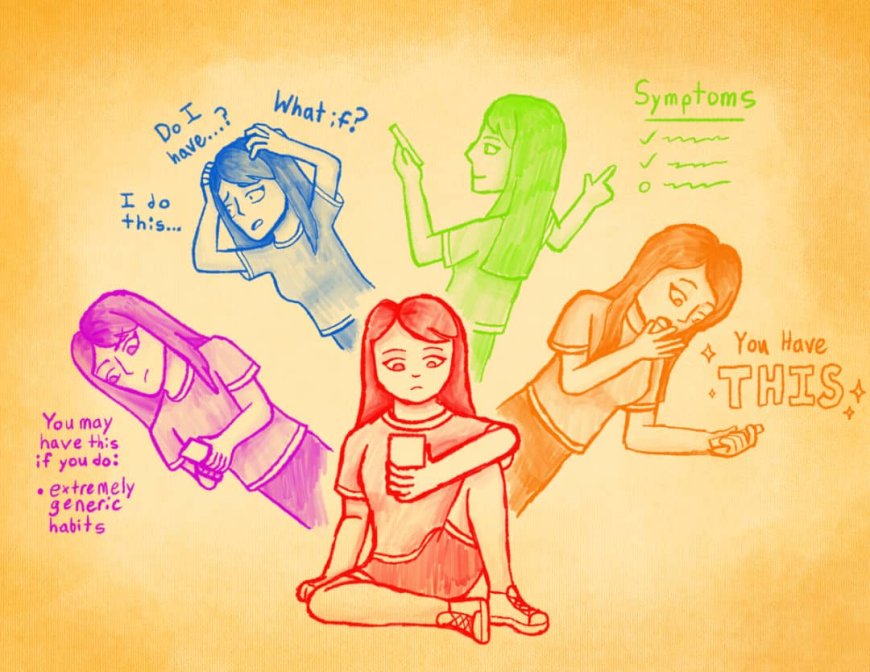Self-diagnosis: A Blow to Mental Health.
This article explores the dangers of self-diagnosis and provides guidance on how to avoid it.

She wakes up at 3:00 am in her routine. A bit bored, she begins to think about her workplace, to escape the thought, then she scrolls through her Tik-Tok feed and stumbles upon a page saying: “If you don’t pick up the call relating to work and your heart beats quickly, or text back when you have a message from your Team lead — You have phone call anxiety.”
She remembers struggling with her work task and decides to distract herself by switching to her Instareels and the algorithm brings forth this: ‘If you forget things easily and you are less interested in your tasks, you are not lazy, but these are signs you are an ADHD patient. If you find it difficult to think things through, you are neurodivergent. Alas! She remembers her predicament aligns with the causes of the disorders. Afterwards, she decides to scroll again for the last time before she sees another reel: “Three signs to know if you have a phone call anxiety disorder, Neuro-divergent, and ADHD...”
Dear reader, she fails to realize that her subconscious mind not only absorbs her habits but also internalizes the repercussions of what she says to herself. Unfortunately, she's not alone in this; many others, as evident from watching social media posts on mental health issues, are also unaware of the implications of their self-criticism and negative self-talk.
Many times, we do this little doctoring of ourselves; someone might be confused as to what I meant by this, but don’t fret we’re all guilty of this. The little doctoring refers to what we call self-diagnosis. According to medical anthropologists, there are three health sectors in each community, one of which is the popular sector, also known as self-diagnostic centres (Kleinman, 1980). The popular sector consists of people around us who share information about health and medical prescriptions based on experience or what they’ve seen before. The popular sector can include individuals like hairdressers, seamstresses, teachers, or anyone in the community. This leads us to the proper definition of self-diagnosis. Before that, it’s important to note that the topic of discussion in this article is the poor habit of self-diagnosis in the mental health space.
According to Dr. Jerome Groopman, author of the book How Doctors Think (2007),” self-diagnosis is defined as ‘the process by which patients identify their own medical problems and determine their own treatments’. This explains how patients or people in general diagnose their illnesses and diseases. They often assume they have the flu because they are coughing and have a high fever, and before long, they get over-the-counter unprescribed drugs. Interestingly, these remedies tend to work most of the time. Self-diagnosis not only describes ways people diagnose themselves from a medical perspective but also how they link it to both cultural and social aspects of their society. This is why we often see people, especially in Nigeria, attributing the cause of an illness to their village people. While self-diagnosis may be accurate to some extent for some people, it undoubtedly endangers them more.
Just like alcohol and hard drugs can become an addiction, self-diagnosis can also become an addiction. There are several instances where people refuse to consult a medical health centre when they are sick, instead relying on the popular sector or social media for diagnosis. This has become a very poor habit among people. According to statistics published by the Journal of Medical Internet Research, approximately 40% of participants reported using the Internet for self-diagnosis, with 24% doing so frequently. In Nigeria, a study conducted in 2021 found that the prevalence of self-medication among students was 54%, indicating that self-diagnosis is not limited to a particular group of people but is widespread among all classes of people. In fact, 6 out of 10 people are known to engage in constant self-diagnosis.
We have been discussing self-diagnosis and medication for a while in this article, and how frequently people engage in this practice. Now, let’s examine the dangers that arise from self-diagnosis and its impact on mental health.
- Incorrect Self Diagnosis: For instance, a young lady became a victim of an advanced brain tumour because she thought it was just a little headache she was having due to stress at work. This shows how a wrong self-diagnosis can lead to the worsening of the illness, exposing the victim to greater danger. Although people may recover after self-diagnosing, this shouldn’t make them forget how likely they are to misinterpret a symptom. There’s a greater chance of misdiagnosing an illness because they’re not medical practitioners that can accurately diagnose it.
- Worsened Health and Mental Condition: The process of self-diagnosis leading to wrong drug prescriptions invariably results in the worsening of the person’s condition. This not only affects the person physically but also impairs their psychological state. As earlier mentioned, the Young lady died as a result of her misdiagnoses which later resulted in a worsened condition.
- Dependency on Specific Drugs: Many times, we’ve seen people who can’t do without using a particular kind of cream for their face or body because once they stop using it, there’s a negative outcome. Similarly, with drugs, once we constantly engage in self-medication, we tend to start depending on those drugs to function properly sooner or later. A case study is that of Ibrahim who constantly used tramadol to boost his energy to engage more in his work and in the process, became so addicted to it.
- Overdose: The most dangerous risk of self-diagnosis is taking more than the expected dosage. This can’t be avoided in self-diagnosis because the amount of dose to be taken by the person is determined by the severity of their illness and personal discretion, not a doctor’s recommendation or prescription. This has endangered lots of people, mostly youths.
These are just some of the several dangers of self-diagnosis on one's mental health and how it can greatly impact a person. Let us also take a look at some of the solutions to these problems.
SOLUTIONS
It's important to seek help from professional medical practitioners in the health sector because this is the most effective way to ensure accurate diagnosis. We also need to adopt the habit of going for regular check-ups and engaging in regular exercise such as yoga, and meditation. They help us discover a positive mindset and free us from being constant hypochondriacs (people who constantly and excessively worry about their health, believing they have serious illnesses). We must also not undermine the benefit of Education and Enlightenment as this helps to create awareness among people, especially in rural communities, about the harm of self-diagnosis, as many individuals in these areas don’t see it as harmful. The health sector needs to work on this aspect by constantly reaching out and teaching people the benefits of using healthcare services and avoiding self-diagnosis and medication. Not only do they teach them but also the government ensures they have adequate access to care, health facilities and professional medical aids. Studies conducted by Medical Anthropologists have shown that people in rural communities have poor access to healthcare facilities and a low number of medical practitioners in this sector. People must have adequate access to healthcare, not only in terms of accessibility but also affordability.
Bottom Line:
One could go on and on about the dangers of the poor habit of self-diagnosis in the mental health space, but as listed above, we also have solutions in view. If only people would adhere to them. As the popular saying goes, ‘prevention is better than cure’ which is why we need to avoid the incessant practice of self-diagnosis. A consequence of this in the Mental Health Space is how we fashion the disorder, playing a significant role in crying wolf for sympathy, which makes us wallow in self-pity. The more we wallow in self-pity, the less we approach our situation fully, and that worsens the habit and chance for productivity.
‘Co-written with Hamid Sowemimo’
What's Your Reaction?




































































































